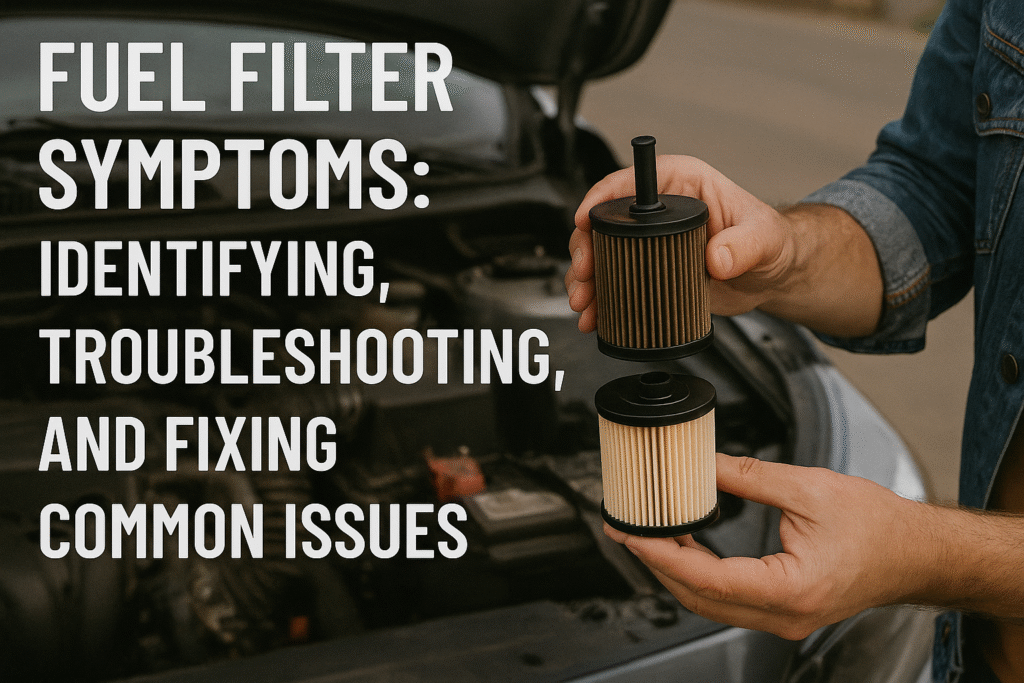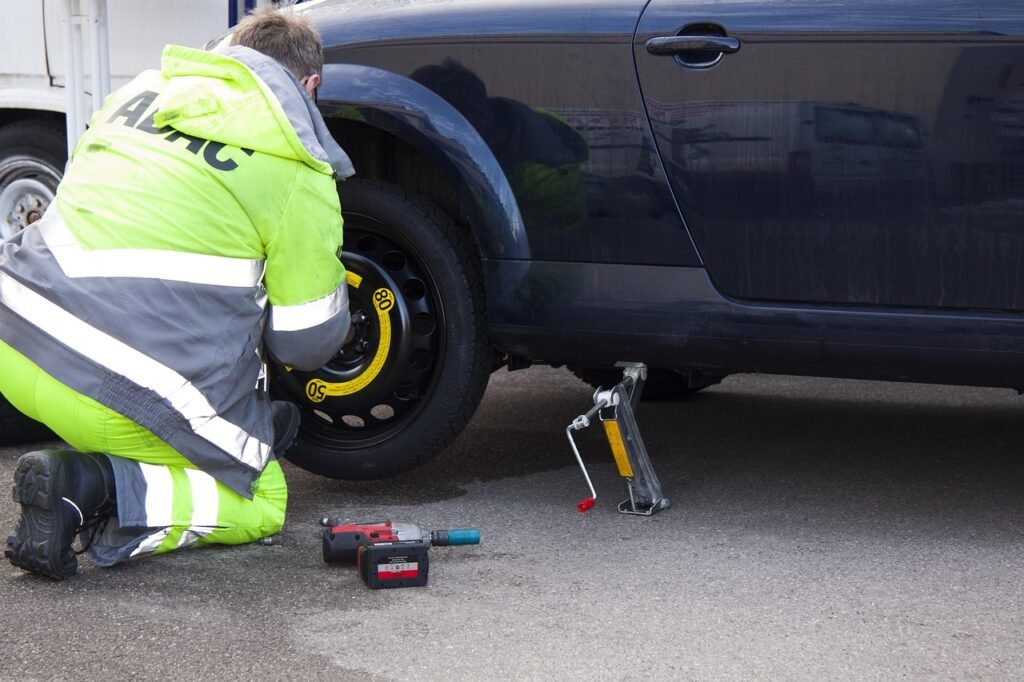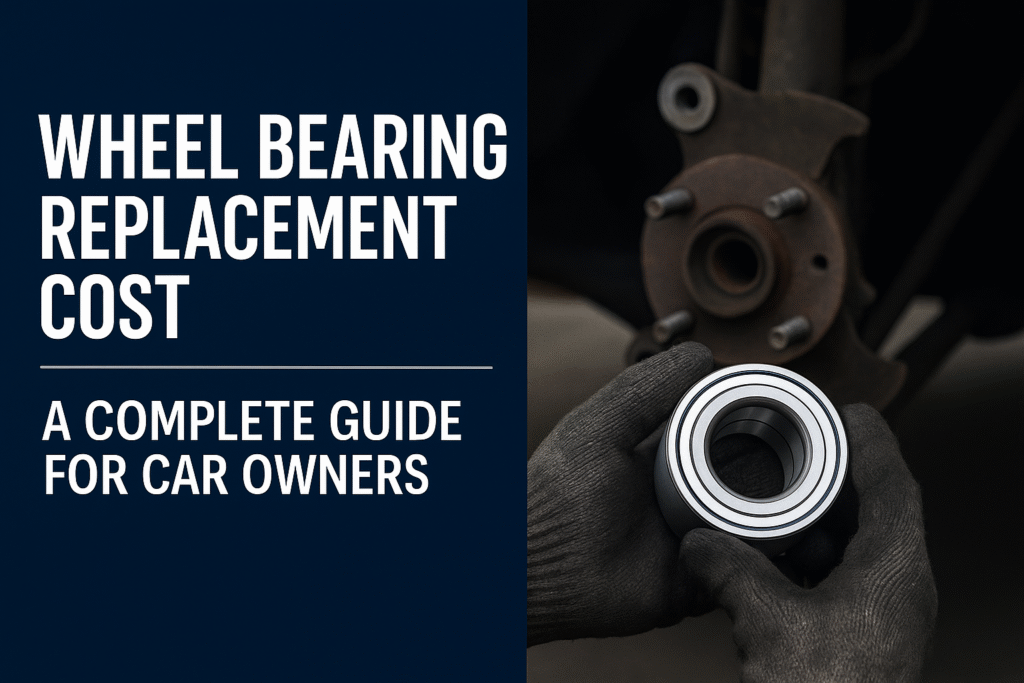The fuel filter plays a vital role in ensuring the smooth operation of your vehicle’s engine by preventing contaminants from reaching the fuel injectors. Over time, the filter can become clogged or damaged, leading to a variety of symptoms that can affect engine performance. Understanding these fuel filter symptoms is essential for identifying potential issues early and avoiding costly repairs.
In this guide, we’ll cover the most common symptoms of a failing fuel filter, how to diagnose the problem, and what you can do to maintain or replace your filter to keep your vehicle running smoothly.
What Is a Fuel Filter and Why Does It Matter?
The fuel filter is a small but essential component in your vehicle’s fuel system. Its primary job is to filter out dirt, debris, and other contaminants from the fuel before it reaches the engine. A clean fuel supply ensures that your engine performs optimally and helps protect the fuel injectors and engine components from damage caused by impurities in the fuel.
Over time, the fuel filter can become clogged with particles, reducing its ability to filter the fuel effectively. When this happens, it can lead to a variety of performance issues, which we’ll discuss in the next section.
Role of the Fuel Filter in Your Vehicle
- The fuel filter ensures only clean fuel enters the fuel injectors, maintaining the engine’s health.
- It acts as a barrier to prevent dirt, rust, and other debris from causing damage to sensitive components in the engine.
Different Types of Fuel Filters
- Inline fuel filters: Often located along the fuel line between the fuel tank and the engine.
- Cartridge fuel filters: Typically found in modern vehicles, housed in a canister within the engine compartment.
Common Symptoms of a Failing Fuel Filter
If you suspect that your fuel filter may be clogged or failing, there are several symptoms you can look out for. Below are the most common fuel filter symptoms that indicate a problem with the filter.
1. Reduced Engine Performance
One of the first signs that your fuel filter may be failing is a reduction in engine performance. If you notice that your vehicle struggles to accelerate, hesitates during hard acceleration, or lacks power on the highway, it may be due to a clogged fuel filter.
- Cause: When the fuel filter is clogged, the engine doesn’t receive enough fuel to operate efficiently. This results in poor acceleration and loss of power.
- Keywords: engine performance issues, poor acceleration, loss of power, clogged fuel filter
2. Engine Misfires or Rough Idling
Another common symptom of a failing fuel filter is engine misfires or rough idling. If your engine struggles to maintain idle speed, stutters, or misfires while driving, the issue could be related to the fuel file ter.
- Cause: A blocked filter restricts fuel flow, causing an imbalanced air-fuel mixture in the engine. This can lead to engine misfires or rough idling.
3. Difficulty Starting the Engine
If you’re experiencing difficulty starting the engine, it could be due to a clogged or dirty fuel filter. When the filter is clogged, not enough fuel can flow to the engine, which may make it harder for the engine to start, especially after the vehicle has been sitting for a while.
- Cause: Insufficient fuel flow due to a clogged filter prevents the engine from receiving the necessary fuel to start.
- Keywords: difficulty starting car, engine won’t start, fuel filter problems
4. Strange Engine Noises
You might hear strange sounds such as sputtering or knocking when your fuel filter is clogged. These noises are caused by the engine running lean, meaning it’s not getting enough fuel to burn.
- Cause: The engine runs on a less-than-ideal fuel mixture, causing the irregular combustion that leads to knocking or sputtering sounds.
- Keywords: engine knocking, engine sputtering, fuel filter sounds
5. Poor Fuel Efficiency
Another indicator that your fuel filter needs attention is decreased fuel efficiency. If you notice your gas mileage dropping significantly without any other obvious cause, it might be due to a clogged filter.
- Cause: A blocked filter reduces the amount of fuel reaching the engine, causing the engine to work harder to perform, which results in poor fuel efficiency.
- Keywords: poor fuel economy, decreased fuel efficiency, bad fuel filter fuel economy
How to Diagnose a Fuel Filter Problem
Diagnosing a fuel filter issue is relatively simple and can often be done through a few basic steps. Here’s how to go about identifying a problem with your fuel filter.
Visual Inspection of the Fuel Filter
One of the easiest ways to identify a clogged fuel filter is by performing a visual inspection. If the filter appears dirty, discolored, or has visible signs of rust or debris, it may need to be replaced.
- Actionable Tip: If your filter is located externally, you can remove it and inspect it for buildup or debris. Many filters are designed to be clear so you can easily check for any contaminants.
Testing Fuel Pressure
Testing fuel pressure with a fuel pressure gauge can also help you determine if the fuel filter is clogged. Low fuel pressure is a common sign of a blocked fuel filter, as the fuel pump struggles to push fuel through the clogged filter.
- Actionable Tip: If the pressure reading is lower than the manufacturer’s specifications, you may need to replace the filter.
Monitoring Engine Behavior During Acceleration
If your car hesitates, jerks, or struggles to accelerate, this may be a direct symptom of a clogged fuel filter. The engine requires a steady flow of fuel, and if it’s being restricted, it can lead to performance issues.
- Actionable Tip: Pay close attention to how the vehicle accelerates. If there’s a noticeable hesitation, it’s likely due to the filter restricting fuel flow.
How to Replace a Fuel Filter
Replacing your fuel filter is an affordable and straightforward task that you can often do yourself, depending on your vehicle. Here’s how to do it:
Tools You Will Need
- Fuel filter wrench, replacement filter, gloves, safety glasses, and a rag.
- Actionable Tip: Always use a high-quality replacement filter that matches your vehicle’s specifications.
Step-by-Step Fuel Filter Replacement Process
- Relieve the Fuel System Pressure: This prevents fuel from spilling out when you disconnect the filter.
- Locate the Filter: Depending on your vehicle, the fuel filter might be located along the fuel line or inside the fuel tank.
- Remove the Old Filter: Use the proper tools to disconnect the fuel lines and remove the old filter.
- Install the New Filter: Secure the new filter in place, ensuring that the arrows on the filter point in the correct direction for fuel flow.
- Reconnect the Fuel Lines: Tighten the connections and make sure everything is secure.
Post-Installation Checks
After you replace the filter, start your car and check for leaks. Ensure the engine runs smoothly and monitor fuel efficiency in the coming days.
When Should You Replace Your Fuel Filter?
Typically, fuel filters should be replaced every 30,000 to 40,000 miles, but this interval can vary depending on the manufacturer’s recommendations. If you notice any of the fuel filter symptoms mentioned above, it may be time to replace the filter sooner.
- Actionable Tip: If you experience any of the symptoms of a clogged fuel filter, replace it immediately to avoid further engine damage.
Fuel Filter Troubleshooting Tips and Solutions
If you’ve replaced the fuel filter but are still experiencing engine problems, there are a few other steps you can take:
What to Do If the Car Doesn’t Start After Fuel Filter Replacement
If your car doesn’t start after replacing the fuel filter, ensure that the filter is correctly installed, and check the fuel lines for any disconnections. If the problem persists, the issue may lie elsewhere in the fuel system.
Dealing with Persistent Engine Issues
If replacing the fuel filter doesn’t resolve engine performance issues, the problem may be with the fuel pump or fuel injectors. In this case, it’s best to consult a mechanic for a full diagnostic.
How to Prevent Fuel Filter Problems in the Future
To extend the life of your fuel filter and prevent future issues:
Keep Your Fuel System Clean
Regularly clean the fuel system and ensure the fuel tank is free of contaminants. Using high-quality fuel can also reduce the chances of debris entering your fuel system.
Avoid Running Your Tank Too Low
Running your vehicle on low fuel can cause dirt and sediment at the bottom of the tank to clog the filter. Keep your tank at least a quarter full to prevent this issue.
Conclusion: Understanding and Addressing Fuel Filter Symptoms
Recognizing fuel filter symptoms early on can save you from costly repairs and ensure your vehicle runs smoothly. Whether you decide to replace the filter yourself or seek professional help, keeping your fuel system clean and maintained is essential to the health of your engine.
Regular inspections, prompt replacements, and proper maintenance are the best ways to avoid future fuel filter problems and keep your car running at its best.
FAQs About Fuel Filter Symptoms
How Do I Know If My Fuel Filter Needs Replacing?
If you notice engine misfires, difficulty starting, rough idling, or poor fuel economy, your fuel filter might need replacing.



